Musk rules: Who wants to be a billionaire?
OPINION: Lessons that will take you to the top of the world’s wealth pile.
Elon Musk's Billionaire School.
OPINION: Lessons that will take you to the top of the world’s wealth pile.
Elon Musk's Billionaire School.
In the early 1950s, Marilyn Monroe’s Hollywood career took off when she played the short-sighted blonde in How to Marry a Millionaire and sang ‘Diamonds are a Girl’s Best Friend’ in Gentlemen Prefer Blondes.
Today, the search for wealth is measured in the billions as even a mortgage-free house in New Zealand qualifies as the ‘millionaire next door’. The list of billionaires is accelerating, much to the chagrin of those who think the world is worse off because of inequality.
Forbes magazine, which popularised Rich Lists, and Bloomberg keep daily tabs on the mega-wealthy based on how their listed companies fared after each session on the New York Stock Exchange.
All the world’s top 10 billionaires are men of European extraction. Only two, Frenchman Bernard Arnault and Mexican Carlos Sim, are not resident in the US. Of the eight others, all but one have their wealth tied up in just four companies. The exception is Elon Musk.
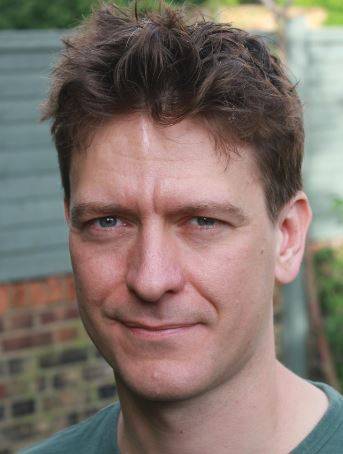
Author Rob Sears.
It is therefore Musk whom Rob Sears chose to be the best teacher for a course on how to be a billionaire. Sears has form in learning from the lives of the famous.
His previous books include Vladimir Putin: Life Coach and The Beautiful Poetry of Donald Trump. For Elon Musk’s Billionaire School, Sears doesn’t have to dig deep for his lampooning effort.
Musk is the subject of at least a dozen serious business books as well as some intended for younger readers. In turn, he has generated dozens of articles about what he has read.
Sears divides his billionaire school course into 47 lessons in four units. Each provides insights into how Musk co-founded six companies – Paypal, Tesla, Space X, etc – and this week was worth a round figure of US$165 billion.
That is shy of what he was worth for most of last year, forcing him to concede his title of the world’s richest man to Arnault, owner of luxury goods companies, whose fortune was worth US$187b on Friday.
Some of the basics to becoming a billionaire of the Musk variety are well documented. Like Bill Gates (no 4), Larry Ellison (no 6), and Larry Page (no 8), dropping out of university and starting business is a must.
As are all-night coding sessions, stealing ideas from science fiction novels, disrupting a major industry sector – for example, Jeff Bezos (no 3) in retailing – and splashing out after the first big cash deal. Musk bought a McLaren F1 supercar after cashing out of Zip2 and crashed it almost immediately.
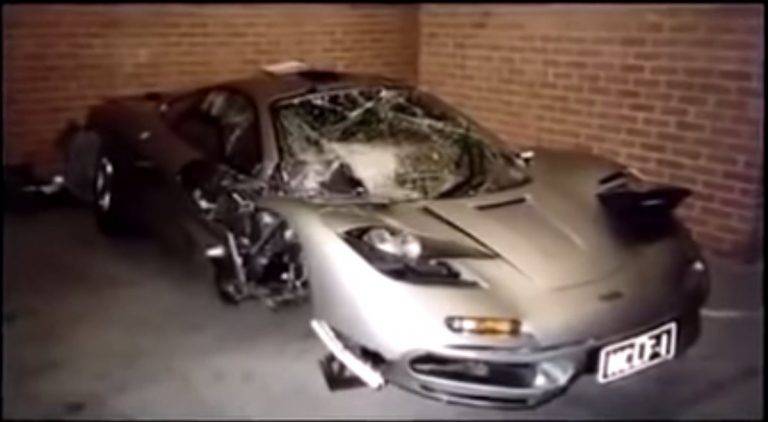
Elon Musk’s crashed McLaren F1.
Crucial to any technology venture is the launch of new products. Here, the billionaire school can draw on many examples from the playbook of Silicon Valley. It used to be called ‘vapourware’ when the techno-kings promised the Earth, and increasingly the moon and Mars, with their software releases.
Sears, in lesson 16, notes Musk has a reputation for promising extremely hopeful timelines for commercialising his companies’ incredible inventions.
Setting timelines … helps keep customers excited and puts a healthy pressure on your engineers. If you can’t deliver on most of your promises, people will become disillusioned – so keep making more to ensure that only a fraction of your promises are broken at any one time.
Musk spoke on this theme just last week at the launch of Tesla’s Master Plan 3, which laid out what steps needed to be taken to convert Earth to a fully sustainable energy infrastructure by 2050.
“There is a clear path to a fully sustainable Earth – with abundance. It doesn’t require destroying natural habitats, it doesn’t require us to be austere and stop using electricity ... I’m often shocked by how few people realise this.”
Tesla’s thesis was that an electrified ecosystem had significantly less wasted energy, requiring about half as much energy consumption for the same standard of living.
“My personal opinion is that, as we improve the energy density of batteries, we will see all transportation go fully electric, with the exception of rockets,” he concluded.
Following the advice in Sears’s lesson, Musk only hinted at future vehicles but said details would come later.
Lesson 31 in Unit 4 (becoming a techno-king) is headed ‘Generate free publicity’. Musk leaves his rivals eating dust in this department.
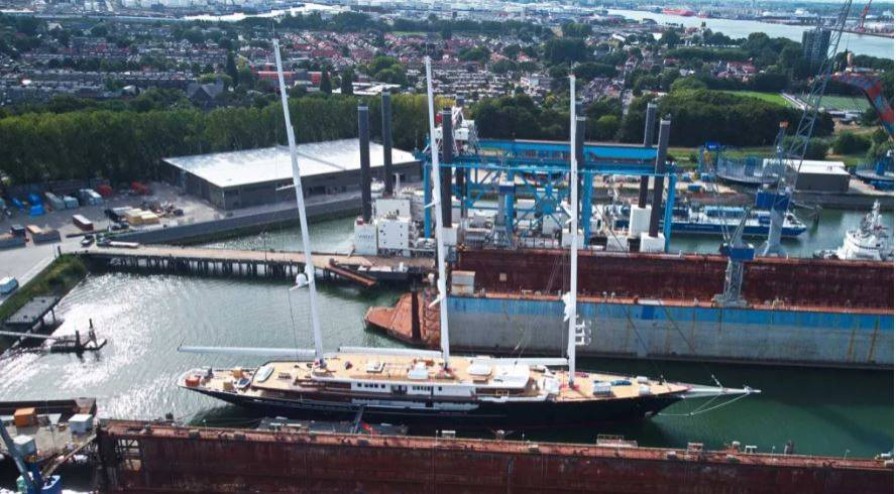
Koru under construction at a Rotterdam shipyard.
Sure, Gates and Bezos got headlines in the past week. The Microsoft founder welcomed his first grandchild and visited India; the Amazon executive chair took possession of the world’s most expensive superyacht. Called Koru, it took five years to build at a cost of US$500 million. It boasts a length of 127m and three 70m masts, the world’s tallest.
Musk practises his anti-advertising strategy through his presence on Twitter, on which he has spent a good deal of his fortune without, it seems, any hope of a return.
Apart from the Tesla announcement, Musk swung in behind eminent scientist Sir Richard Dawkins on his tweet promoting his Spectator column about his recent speaking tour of New Zealand and the issue of incorporating of mātauranga Māori into the science curriculum: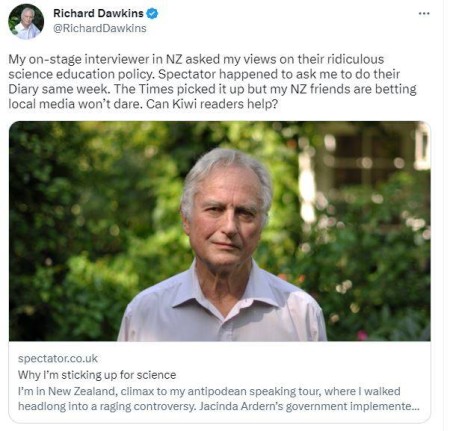

Musk also entered the debate over Columbia University dropping its mandatory requirements of knowledge in science and mathematics to encourage more diversity among its students.
He was commenting on a tweet from venture capital investor Marc Andreessen, of Netscape fame, who agreed with a Twitter user that Columbia's decision was a victory for Affirmative Action in elite colleges at the expense of meritocracy.
Elsewhere, the New York Post was reporting that Musk had consulted artificial intelligence researchers to develop his own AI Chatbot in a bid to challenge the Microsoft-backed ‘woke’ version. Musk accused its creator, OpenAI, of bias and restricting free expression.
Wrapping up a busy week, the Wall Street Journal revealed the until now secretive plans to build a town in Texas to house his employees in an urban utopia along the Colorado River.
The fifth and final unit of Sears’s course is ‘Saving humanity, escaping humanity’, a reference to the “time in every billionaire’s journey when the mind turns to thoughts of legacy and the immortal glory that your accumulated money, power and status could buy”.
The choice of 12 catastrophic threats that weigh on the conscience of billionaires includes climate change and nuclear war, of course, but also Musk’s onetime priorities of falling birth rates, AI (artificial intelligence), and religious extremism.
It’s a popular belief that some Silicon Valley billionaires are preparing for doomsday by establishing remote hideaways – Peter Thiel and Queenstown comes to mind – but that’s minor thinking alongside the real alphas, Sears advises.
Bezos and his rocket business, Blue Origin, “wants to move humanity off-planet into a giant orbiting cylinder with Earth kept as a kind of low-population Yellowstone National Park for occasional camping trips,” a quote that is sourced to an interview he gave in November 2021.
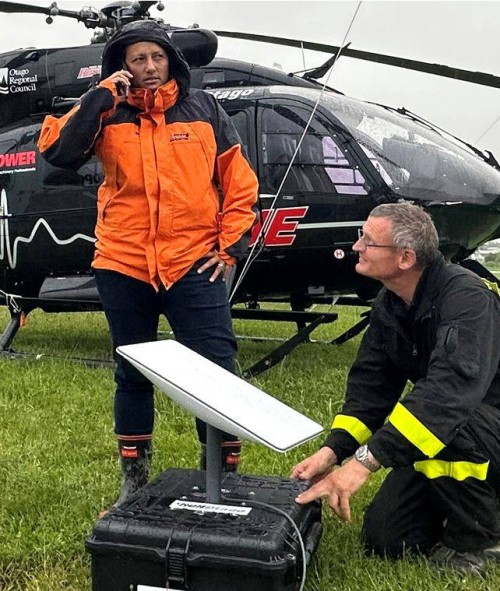
Kiri Allan uses Starlink assisted by paramedic Anthony Hoets. Photo: Graeme Gale.
Musk, not to be outdone, envisages a colony of up to a million Earthlings living on Mars by 2050, despite the many drawbacks of that plant’s lack of an atmosphere, high radioactivity, and sandstorms.
It’s worth noting here that Musk’s Starlink was a lifesaver in the Hawke’s Bay floods when all other forms of communication collapsed.
There’s no room in the Musk billionaire school for failure, though Meta’s Mark Zuckerberg (no 13 on Bloomberg’s list) is adding a lesson of his own.
According to recent reports, the ‘metaverse’ of Facebook, Instagram, and WhatsApp is dead. “There will be no press release, no big announcement, as he would have to acknowledge that he was wrong,” one said.
That is part of the billionaire school ethos. So is the news of Zuckerberg and his wife Dr Priscilla Chan’s announcement that they will build a new US$250m biomedical research facility in Chicago run by three universities.
That is peanuts compared with the estimated cumulative loss of US$24b spent on Reality Labs, the division housing metaverse projects.
Musk, too, is already into university-based research with his financing of The Future of Humanity Institute at Oxford University.
It is said to be the home for ‘long-termist’ philosophers who “dream of a hyper-populated universe in which star systems everywhere are packed with trillions of cloud-hosted computer consciousnesses.”
That is a vision only graduates from the billionaire school can fulfil.
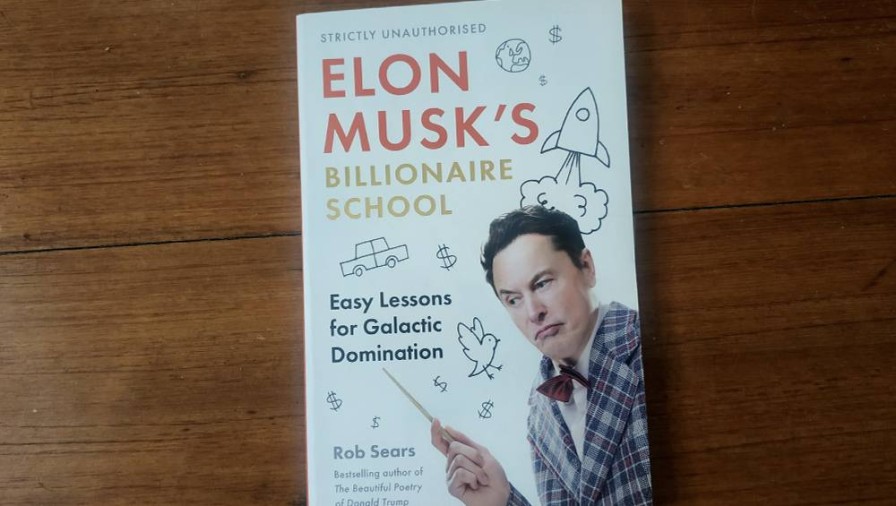
Elon Musk’s Billionaire School, by Rob Sears (Canongate).
Nevil Gibson is a former editor at large for NBR. He has contributed film and book reviews to various publications.
This is supplied content and not paid for by NBR.